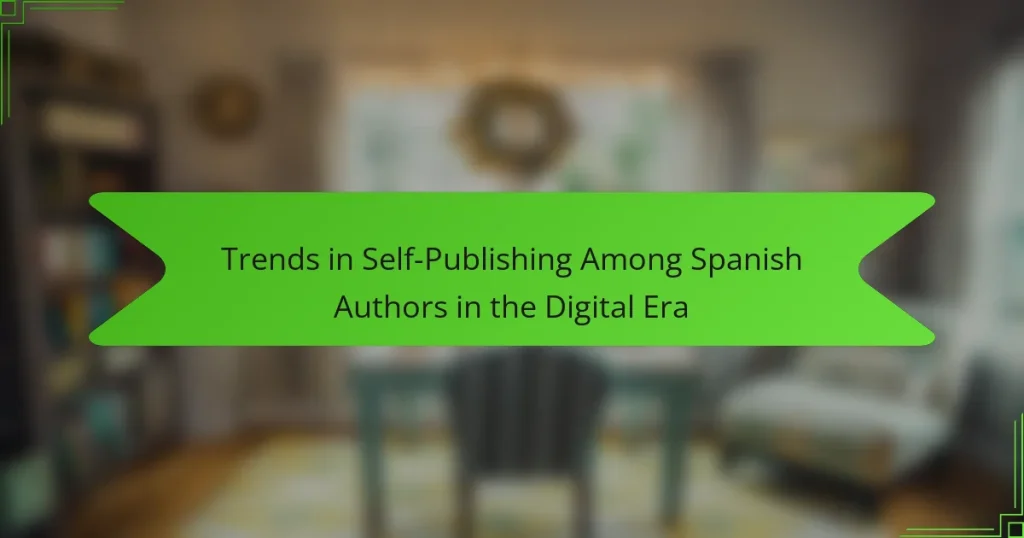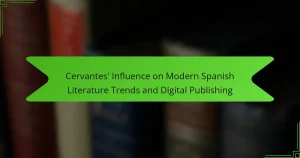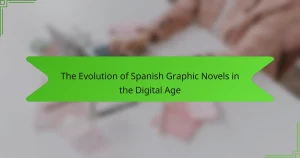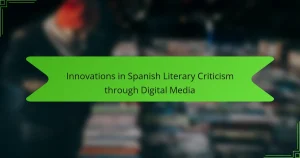Self-publishing among Spanish authors is rapidly evolving, presenting both opportunities and challenges. Key trends include the rise of hybrid publishing models, the importance of social media marketing, and the adoption of data analytics tools. While authors benefit from increased accessibility and engagement, they also face market saturation and visibility issues. Innovations like audiobooks and AI tools are shaping the future of self-publishing in the Spanish-speaking market.
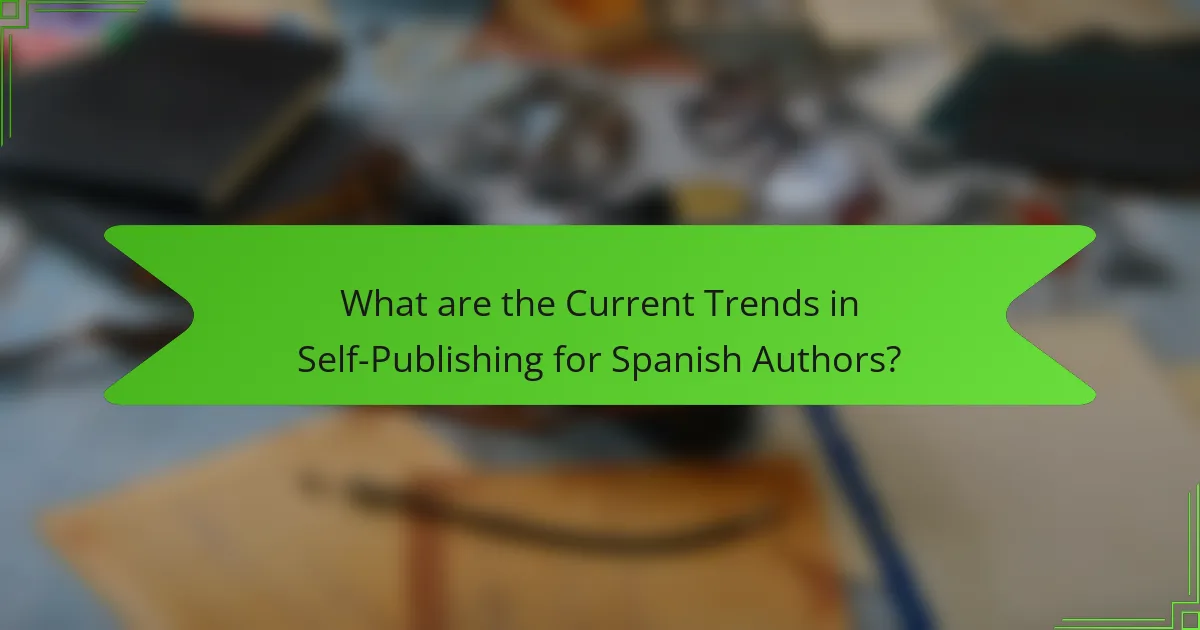
What are the Current Trends in Self-Publishing for Spanish Authors?
Self-publishing trends among Spanish authors are evolving rapidly in the digital era. Authors are increasingly leveraging online platforms to reach wider audiences and retain control over their work.
One significant trend is the rise of hybrid publishing models, allowing authors to combine traditional and self-publishing elements. This approach offers greater flexibility and opportunities for revenue generation.
Another trend is the increasing importance of social media marketing. Spanish authors are utilizing platforms like Instagram and Twitter to build their brands and engage with readers directly.
Additionally, data analytics tools are being adopted to understand reader preferences and optimize marketing strategies. This data-driven approach enhances the effectiveness of promotional efforts and increases sales potential.
How Have Digital Platforms Changed the Self-Publishing Landscape?
Digital platforms have significantly transformed the self-publishing landscape for Spanish authors. These platforms enable wider reach and accessibility, allowing authors to publish without traditional gatekeeping.
The rise of e-books and print-on-demand services has reduced upfront costs for authors. This democratization fosters diverse voices and genres, attracting a broader audience. Increased online marketing tools empower authors to promote their work effectively.
Moreover, social media has become a vital channel for engagement. Spanish authors leverage platforms like Instagram and Twitter to build their brands and connect with readers. This direct interaction enhances visibility and sales potential.
Overall, digital platforms have reshaped self-publishing, offering Spanish authors unprecedented opportunities to share their stories globally.
Which Genres are Most Popular Among Self-Published Spanish Authors?
Contemporary self-published Spanish authors predominantly favor genres like romance, fantasy, and thriller. These genres resonate due to their broad appeal and market demand. Romance, in particular, has seen significant growth, often featuring unique cultural narratives. Fantasy and thriller genres attract readers with immersive storytelling and suspenseful plots. This trend reflects a shift towards diverse and engaging narratives in the digital publishing landscape.
What Role Do Social Media and Online Communities Play in Self-Publishing?
Social media and online communities significantly enhance self-publishing for Spanish authors by providing vital platforms for marketing and audience engagement. These tools enable authors to directly connect with readers, receive feedback, and build a loyal following.
The rise of social media has transformed traditional publishing dynamics, allowing authors to bypass gatekeepers. This democratization fosters creativity and innovation, as diverse voices gain visibility. Online communities, such as writing forums and social networks, facilitate collaboration and support among authors, enhancing their skills and promoting their works.
Furthermore, statistics indicate that over 70% of self-published authors utilize social media for promotion, highlighting its critical role in modern publishing strategies. This trend reflects a unique attribute of the digital era, where authors leverage technology to navigate the complexities of the publishing landscape.
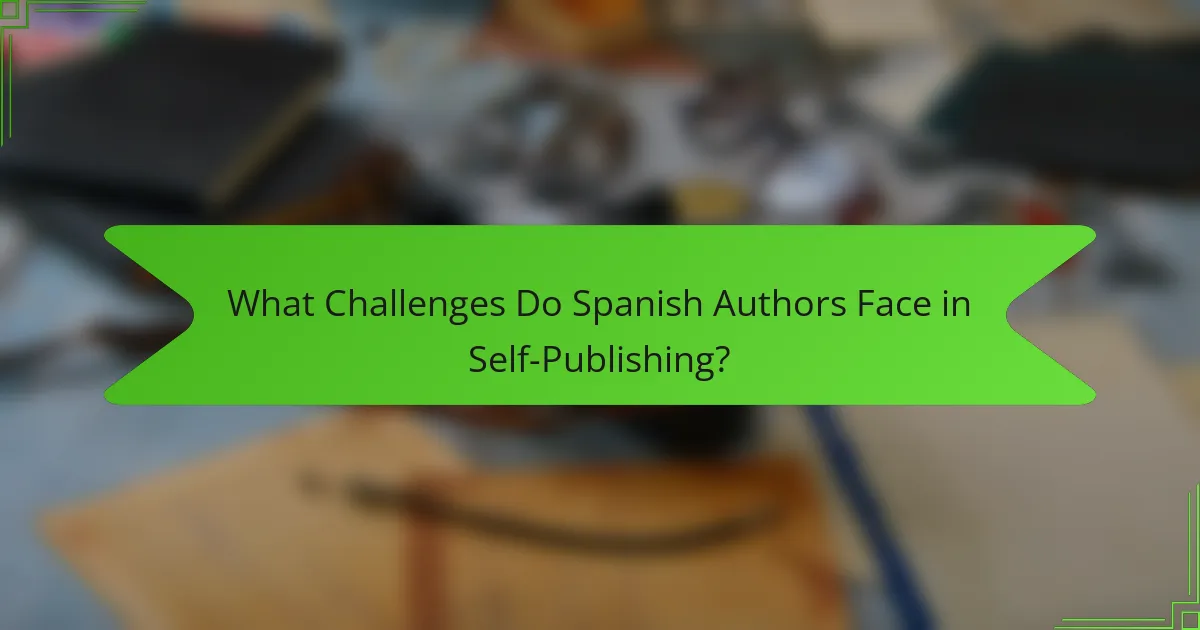
What Challenges Do Spanish Authors Face in Self-Publishing?
Spanish authors face several challenges in self-publishing, including market saturation, distribution difficulties, and limited visibility. The digital era has made it easier to publish, yet authors must navigate a crowded landscape. Many struggle with marketing their work effectively, as competition intensifies. Additionally, obtaining quality feedback and professional editing can be challenging without traditional publishing support. Authors often encounter financial constraints, limiting their ability to invest in promotion and production.
How Does Market Competition Impact Self-Publishing Success?
Market competition significantly influences self-publishing success by shaping visibility and sales potential. In the digital era, Spanish authors face both challenges and opportunities. Increased competition leads to a saturated market, making it essential for authors to differentiate their work. Unique attributes, such as cultural relevance and innovative marketing strategies, can enhance an author’s appeal. Additionally, leveraging social media and digital platforms can amplify reach, allowing authors to connect with specific audiences. As a result, understanding market trends is crucial for success in self-publishing.
What Are the Common Misconceptions About Self-Publishing?
Many believe self-publishing lacks quality, but Spanish authors are increasingly producing high-caliber works. A common misconception is that self-publishing is only for amateur writers. In fact, many successful Spanish authors have embraced this model, leveraging digital platforms to reach wider audiences. Another myth is that self-publishing guarantees instant success; however, it often requires significant marketing efforts. Additionally, some think self-publishing limits creative control, while many authors find it empowers them to make all artistic decisions. Lastly, there is a belief that self-published books are harder to find, yet digital distribution has made them more accessible than ever.
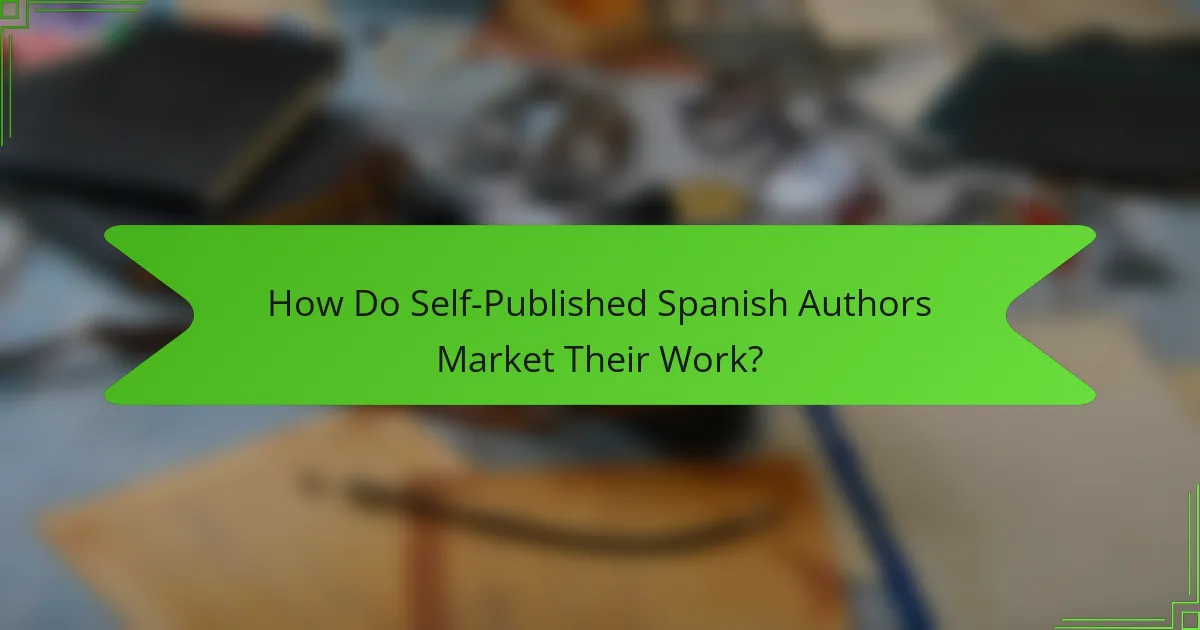
How Do Self-Published Spanish Authors Market Their Work?
Self-published Spanish authors market their work through social media, book fairs, and collaborations. They leverage platforms like Instagram and Twitter to connect with readers and promote their books. Additionally, many authors participate in virtual events to reach wider audiences, enhancing visibility and engagement. Influencer partnerships and targeted advertising campaigns are also common strategies. As digital tools evolve, these authors adapt their marketing techniques to stay relevant in the competitive landscape.
What Strategies Are Most Effective for Reaching Readers?
Effective strategies for reaching readers include leveraging social media, utilizing email marketing, and engaging in online communities. Spanish authors can harness platforms like Instagram and Facebook to showcase their work and connect with audiences. Email marketing allows for direct communication, fostering a loyal readership. Participating in online forums and groups related to their genre enhances visibility and builds relationships. Emphasizing unique cultural narratives can also attract diverse readerships, setting Spanish authors apart in the global digital landscape.
Which Tools and Resources Do Authors Use for Promotion?
Authors use various tools and resources for promotion, including social media platforms, email marketing services, and author websites. Social media helps reach wider audiences, while email marketing fosters direct connections. Author websites serve as central hubs for information and sales. Additionally, online courses and webinars can enhance marketing skills.
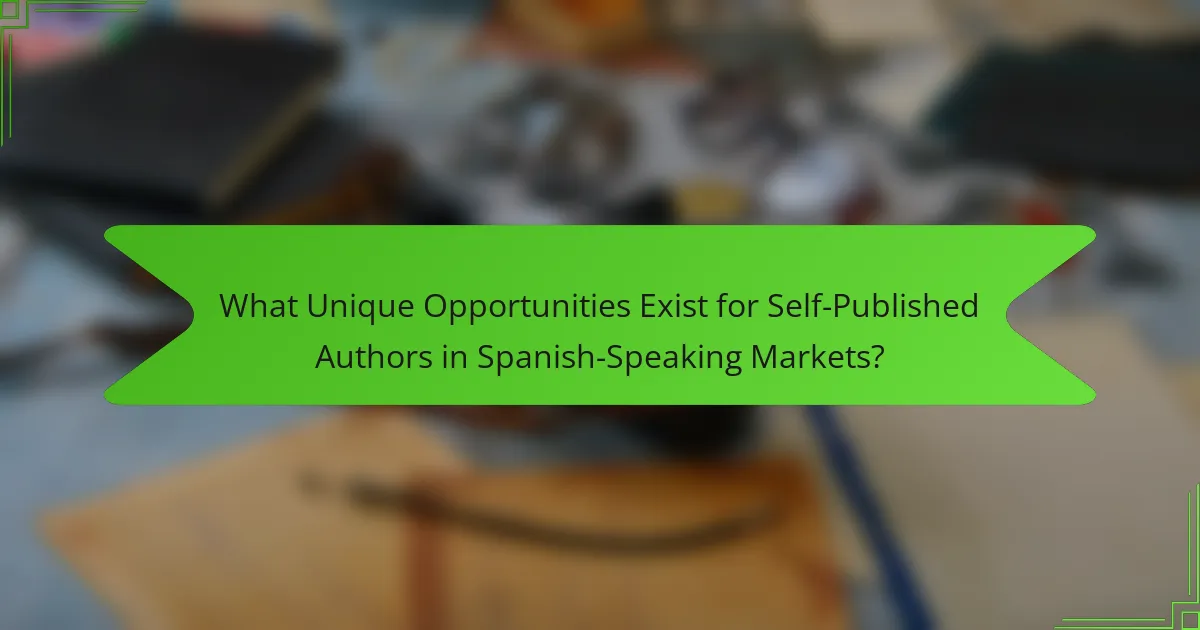
What Unique Opportunities Exist for Self-Published Authors in Spanish-Speaking Markets?
Self-published authors in Spanish-speaking markets have unique opportunities driven by digital trends. The rise of e-books and audiobooks has expanded accessibility, allowing authors to reach diverse audiences. Additionally, social media platforms facilitate direct engagement with readers, enhancing marketing efforts. Data shows that Spanish-language content consumption is growing, indicating a robust market potential. Moreover, niche genres, such as self-help and children’s literature, are gaining traction, presenting opportunities for targeted content creation.
How Can Authors Leverage Regional Literary Events and Festivals?
Authors can leverage regional literary events and festivals to enhance visibility and connect with audiences. Participation in these events allows authors to showcase their work, network with industry professionals, and engage with local readers.
Regional festivals often highlight cultural themes relevant to Spanish authors, fostering a sense of community. These events provide opportunities for workshops, panel discussions, and book signings, which can significantly boost an author’s profile.
Moreover, attending such festivals can lead to collaborations with other authors and publishers, expanding their reach. Authors can also gather feedback directly from readers, helping them refine their craft and marketing strategies.
In the digital era, promoting participation through social media can amplify an author’s presence before, during, and after the event, creating lasting connections with a broader audience.
What Are the Benefits of Collaborating with Local Influencers?
Collaborating with local influencers enhances visibility and credibility for Spanish authors in the digital publishing landscape. Influencers can amplify marketing efforts, reaching targeted audiences effectively. They provide authentic engagement, fostering community connections. Additionally, partnerships may lead to increased sales and readership, driving long-term success in self-publishing.

What Are the Core Attributes of Successful Self-Published Works?
Successful self-published works by Spanish authors in the digital era exhibit attributes like strong storytelling, effective marketing strategies, and reader engagement. They often leverage social media platforms to connect with audiences, enhancing visibility. Unique attributes include cultural authenticity and bilingual content, appealing to diverse readerships. Rarely, some authors experiment with multimedia formats, enriching the reading experience.
How Important is Quality Editing and Design in Self-Publishing?
Quality editing and design are crucial in self-publishing. They enhance readability, establish professionalism, and attract a wider audience. Spanish authors in the digital era benefit from quality editing by improving narrative clarity and coherence, which is vital for engaging readers. Effective design, including cover art and layout, plays a significant role in marketing and sales potential. Research shows that well-designed books can increase sales by up to 30%. Emphasizing quality in these aspects helps authors stand out in a competitive market.
What Factors Contribute to Positive Reader Reviews and Engagement?
Positive reader reviews and engagement stem from the quality of storytelling, relatable characters, and effective marketing strategies. Spanish authors in self-publishing leverage digital platforms to connect with audiences, enhancing visibility and reader interaction. Authenticity in voice and cultural representation also drives positive reception. Engaging with readers through social media fosters community and loyalty, crucial for sustained success.
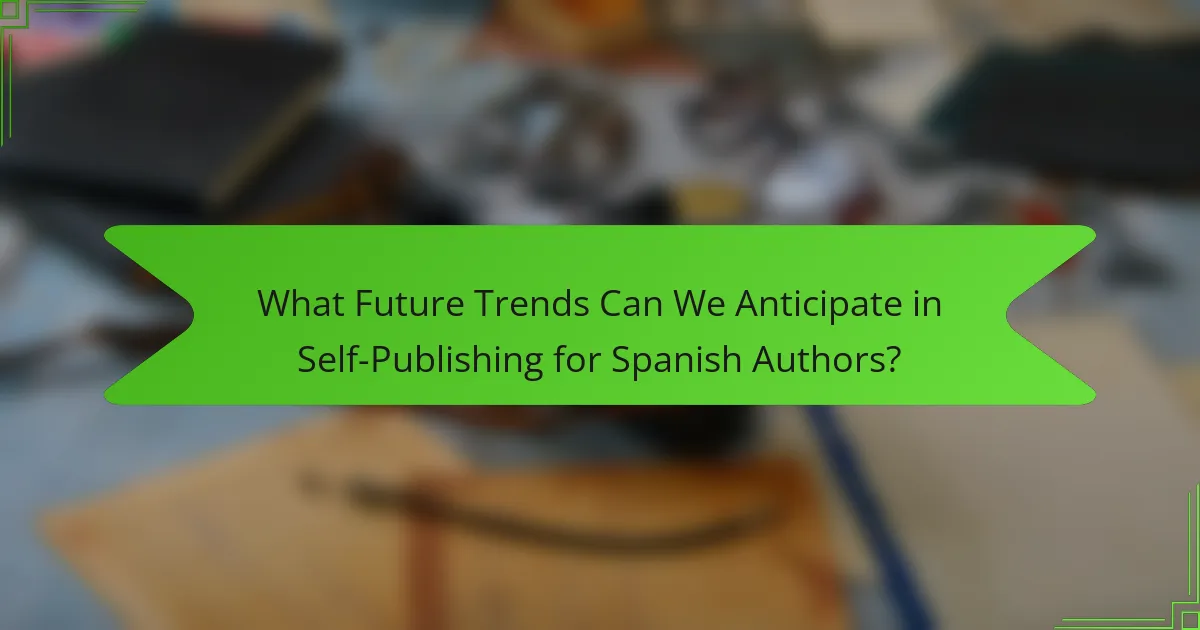
What Future Trends Can We Anticipate in Self-Publishing for Spanish Authors?
Self-publishing for Spanish authors is increasingly embracing digital innovations, community engagement, and diverse distribution channels. Authors can anticipate trends such as the rise of audiobooks, enhanced use of social media marketing, and the growing importance of reader feedback in shaping content.
The integration of artificial intelligence tools for editing and marketing will streamline the publishing process. Increased collaboration among authors, editors, and graphic designers through online platforms will enhance the quality of self-published works.
Moreover, there will be a focus on niche genres that cater to specific cultural and regional interests, reflecting the diverse Spanish-speaking audience. As a result, Spanish authors will have more opportunities to reach global markets, leveraging technology to expand their readership.
How Might Emerging Technologies Influence Self-Publishing Practices?
Emerging technologies significantly enhance self-publishing practices for Spanish authors. Digital platforms streamline the publishing process, allowing authors to reach wider audiences quickly. For instance, advancements in artificial intelligence enable personalized marketing strategies, improving reader engagement. Additionally, blockchain technology ensures copyright protection, fostering trust among authors. Social media tools facilitate direct communication with readers, creating loyal fan bases. These innovations empower Spanish authors to navigate the digital landscape effectively and thrive in self-publishing.
What Are the Predictions for Market Growth in the Coming Years?
Predictions indicate significant market growth for self-publishing among Spanish authors in the coming years. The digital era has empowered authors to reach wider audiences and streamline publishing processes.
The self-publishing market is expected to grow at a compound annual growth rate (CAGR) of over 20% from 2024 to 2030. Factors contributing to this growth include increased access to digital platforms and changing reader preferences.
Additionally, Spanish authors are leveraging social media and online marketing to promote their work, further enhancing visibility and sales potential. This trend reflects a broader shift in the publishing landscape, emphasizing the importance of digital literacy among authors.
As a result, the self-publishing sector is becoming a vital component of the literary economy in Spanish-speaking countries, fostering diverse voices and innovative narratives.
What Best Practices Should Self-Published Authors Follow to Succeed?
Self-published authors should focus on high-quality writing, effective marketing, and understanding their audience. Emphasizing professional editing enhances credibility. Engaging with readers through social media builds a loyal following. Utilizing platforms tailored for Spanish authors increases visibility in the digital market. Regularly updating content keeps the audience engaged and informed.
